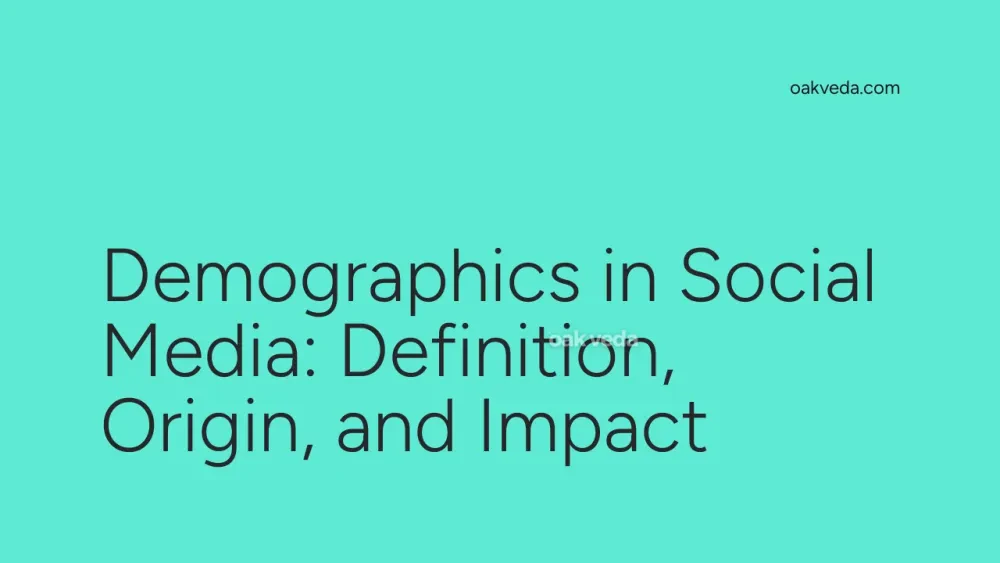
What are Demographics in Social Media?
Demographics in social media refer to the statistical characteristics of users on various platforms. These traits include age, gender, location, income, education level, and occupation. Social media platforms collect this data to provide valuable insights into their user base, which is crucial for marketers, advertisers, and businesses aiming to understand and target specific audience segments.
Origin and Development of Demographics in Social Media
The use of demographics in social media marketing has evolved alongside the growth of social platforms. As social networks gained popularity, they began collecting user data to improve their services and offer targeted advertising options. This practice became more sophisticated with the advent of big data analytics and machine learning algorithms, allowing for more precise audience segmentation and targeting.
How Demographics Work in Social Media
Social media platforms gather demographic information through various means:
- User-provided data during account creation
- Behavioral data based on user interactions
- Third-party data partnerships
- Inference algorithms that predict user characteristics
This information is then aggregated and anonymized to protect individual privacy while providing valuable insights to advertisers and marketers.
Types of Demographic Data in Social Media
Common types of demographic data collected and used in social media include:
- Age and Generation: Helps tailor content to different age groups
- Gender: Allows for gender-specific targeting and messaging
- Location: Enables geo-targeting and localized campaigns
- Income: Assists in targeting users based on purchasing power
- Education Level: Helps in creating appropriate content complexity
- Occupation: Allows for profession-specific targeting
- Relationship Status: Useful for targeting specific life stages
- Interests and Hobbies: Helps in creating relevant content and ads
Popular Examples of Demographics Use in Social Media
- Facebook Audience Insights: Provides detailed demographic information about a brand's audience and potential customers.
- Instagram Insights: Offers demographic breakdowns for business accounts, including age, gender, and location of followers.
- Twitter Analytics: Provides demographic data on followers, including interests, occupation, and household income.
- LinkedIn Audience Insights: Offers B2B-focused demographic data, including job titles, industries, and company sizes.
Impact of Demographics on Social Media Culture
Demographics have significantly influenced social media culture by:
- Shaping Platform Development: Platforms evolve features based on demographic preferences.
- Influencing Content Trends: Different age groups and demographics drive various content trends.
- Affecting User Behavior: Demographics impact how users interact with content and each other.
- Driving Personalization: Platforms use demographics to tailor user experiences.
Controversies Surrounding Demographics in Social Media
While demographics are valuable for marketers, they've also sparked debates:
- Privacy Concerns: The collection and use of personal data raise privacy issues.
- Algorithmic Bias: Demographic-based algorithms can perpetuate stereotypes or discrimination.
- Filter Bubbles: Demographic targeting can limit exposure to diverse perspectives.
- Data Accuracy: Self-reported data may not always be reliable or up-to-date.
How Brands and Influencers Use Demographics
Brands and influencers leverage demographic data to:
- Target Specific Audiences: Create campaigns that resonate with particular demographic groups.
- Customize Content: Tailor messaging and visuals to appeal to specific demographics.
- Optimize Ad Spend: Allocate budgets more effectively by targeting responsive demographics.
- Develop Products: Use demographic insights to inform product development and marketing strategies.
- Choose Platforms: Focus efforts on platforms where target demographics are most active.
Future Trends Related to Demographics in Social Media
The future of demographics in social media is likely to include:
- Increased Granularity: More detailed and nuanced demographic segmentation.
- AI-Driven Insights: Advanced AI algorithms providing deeper demographic analysis.
- Cross-Platform Integration: Unified demographic data across multiple social platforms.
- Ethical Considerations: Greater focus on privacy and ethical use of demographic data.
- Real-Time Demographics: Dynamic demographic targeting based on real-time user behavior.
FAQs about Demographics in Social Media
-
Why are demographics important in social media marketing? Demographics help marketers understand their audience, tailor content, and optimize ad campaigns for better engagement and ROI.
-
How can I access demographic data for my social media audience? Most major social media platforms offer built-in analytics tools that provide demographic insights for business accounts.
-
Are social media demographics always accurate? While generally reliable, demographic data can have limitations due to self-reporting and privacy settings.
-
How often should I review my audience demographics? It's recommended to review demographic data regularly, at least quarterly, to stay updated on audience changes and trends.
-
Can demographics help with content creation? Yes, understanding your audience demographics can inform content topics, tone, and format to better resonate with your followers.
In conclusion, demographics play a crucial role in shaping social media strategies and user experiences. As platforms continue to evolve, the intelligent use of demographic data will remain a key factor in successful social media marketing and engagement. However, it's essential to balance the benefits of demographic targeting with ethical considerations and user privacy to maintain trust and authenticity in the social media landscape.
You may be interested in:
- TikTok Reactions: Definition, Origin, and Impact
- Mute: Definition, Origin, and Impact on Social Media
- Brand Ambassador: Definition, Origin, and Impact
- Nano-Influencer: Definition, Origin, and Impact
- Menty B: Definition, Origin, and Impact on Social Media
- Unfollow: Definition, Origin, and Impact on Social Media

